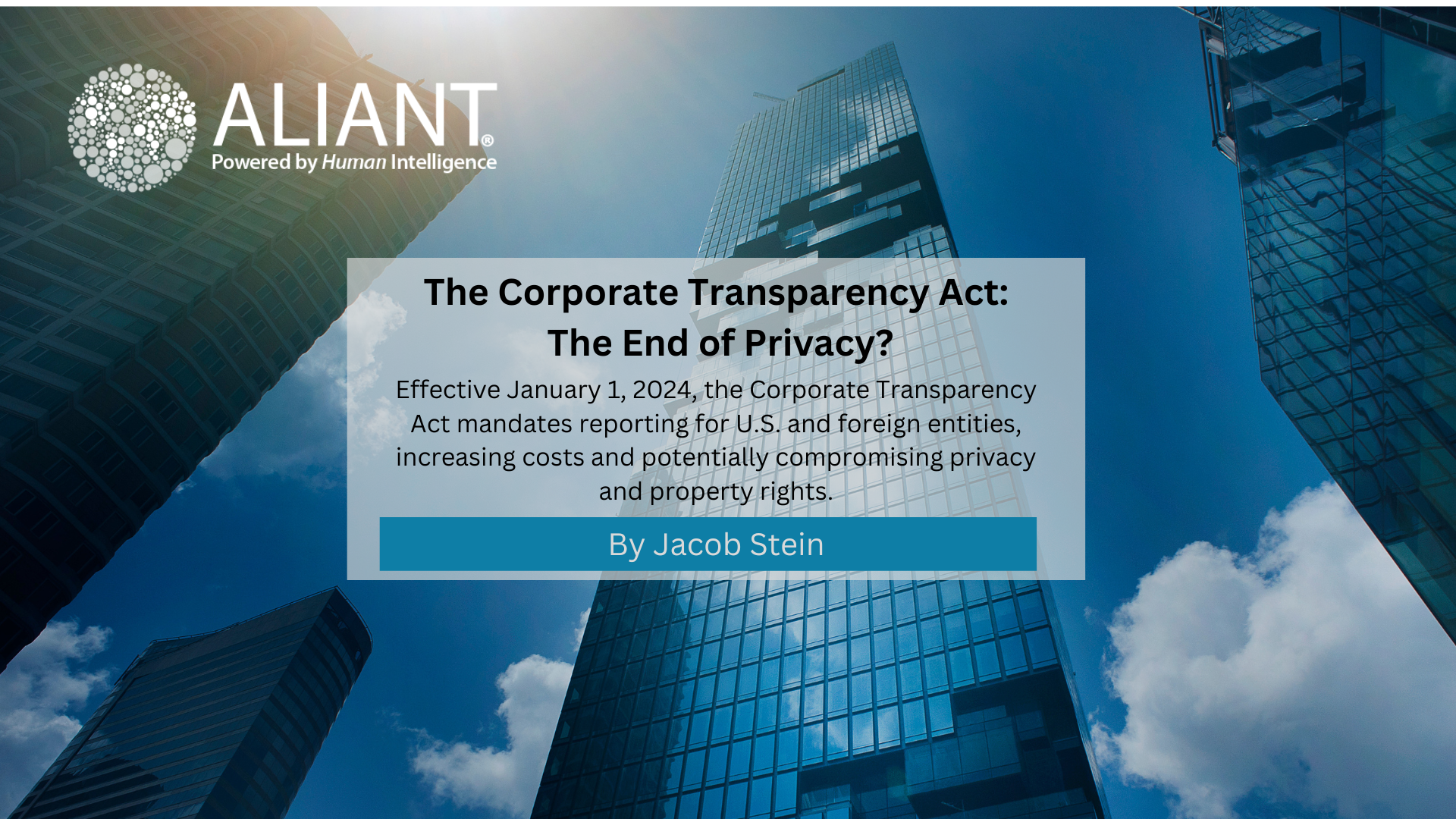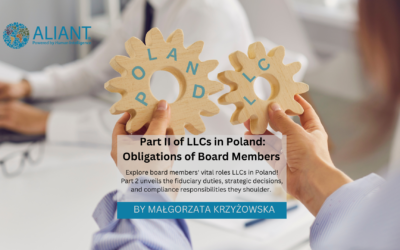Commencing on January 1, 2024, the Corporate Transparency Act (the “CTA”) will come into force in the United States, with its primary aim being the establishment of a mandatory reporting system for many U.S. and foreign entities. The stated goal of the CTA is to fight money laundering, tax evasion, corruption, terrorist funding, and even human trafficking.
This new federal law will impose new responsibilities on small and medium-sized enterprises, necessitating the gathering, reporting, and continuous monitoring of specific information to ensure compliance with its provisions. This means that having a legal entity in the United States will become more expensive (reporting costs money), and privacy and property rights will be further eroded. Similar laws have been enacted in the European Union and other countries in the past several years as sovereign states seek new means of collecting tax revenues and combating money laundering.
A central requirement under the CTA is the submission of a report known as Beneficial Ownership Information (BOI) to the Financial Crimes Enforcement Network (FinCEN), an agency within the U.S. Department of Treasury. The purpose of this report is to assemble data that assists government authorities in identifying the true owners or controllers of a legal entity. Non-compliance with the CTA can lead to both civil penalties (up to $10,000 with a daily fine of $500) and criminal penalties (a maximum of two years’ imprisonment).
Under the CTA a “reporting company” is any new or existing U.S. or foreign entity. This is a very broad term, and includes corporations, LLCs, limited partnerships, and trusts, that are registered for business operations in the United States. This implies that any registered entity formed through the submission of documents with any Secretary of State is subject to reporting. By this definition entities that are not registered – like general partnerships and private trusts – are not subject to reporting.
There are a lot of specifically enumerated exemptions from CTA reporting – about 23 by my count. These include publicly listed companies, banks and money transmitting businesses, insurance companies, accounting firms, tax-exempt entities, businesses that have both more than 20 employees and more than $5 million of revenues, and inactive entities formed prior to 2020.
A beneficial owner is defined as either a) an individual who possesses or controls 25% or more of the reporting company’s ownership, or b) an individual with “substantial control” over the reporting company. “Substantial control” describes an individual who holds a senior officer position in the company, wields authority over the appointment or removal of any senior officer, or exercises significant influence over critical matters related to the reporting company.
Ownership is tested on a direct and indirect basis, by using attribution rules, although it is not currently clear which set of attribution rules will be used. Looking at other federal laws where attribution is used (like the Internal Revenue Code), ownership is often attributed through related parties (like family members) or through controlled entities.
In the United States private trusts are not registered with any governmental entity and are unlikely to be reporting companies under the CTA. Trusts can be beneficial owners of a reporting entity and their existence would then need to be disclosed in that capacity. If a trust is a beneficial owner then the individuals reporting their personal information may include the trustee of the trust, the protector of the trust, the settlor of a trust, and a person who has the power to revoke the trust.
Reporting companies are obligated to disclose specific details about their beneficial owners, including their full legal names, dates of birth, residential addresses, and “a unique identifying number from a non-expired passport issued by the United States, a non-expired personal identification card, or a non-expired driver’s license issued by a State.”
The report will be submitted online through FinCEN’s website. It is important to note that the filing website has not yet been made available. Existing reporting companies must register their BOI with FinCEN before January 1, 2025, allowing ample time for compliance. For new reporting companies established after January 1, 2024, they will have a 30-day window from their formation date to submit their BOI report.
This new requirement will impose new burdens on both clients and law firms. Our firm alone has created hundreds of LLCs for clients over the many years we have been practicing law. The simple task of assembling a list of all the LLCs we have created and notifying the clients of this new requirement will take a significant amount of time. Clients will then need to decide whether disclosing the required information is non-detrimental and task us with ways around the new law.
While the CTA ostensibly is targeting money laundering and tax evasion, it will also pick up many legal entities that were formed to achieve privacy or asset protection without engaging in criminal behavior. We are told that the information submitted to FinCEN will remain with FinCEN, but there is no real way to know that.
We expect that in the coming months we will be busy adjusting ownership structures of many legal entities and replacing officers. We will also be more careful, starting in 2024, how we form legal entities. Often clients will have us form a legal entity and then spend months negotiating the operating agreement with other investors. How do we report beneficial ownership within 30 days of forming an entity if we do not at that time know who the beneficial owners will be?
Hopefully these and many other questions will be answered before the CTA goes online. Stay tuned!
Bypassing the reporting requirements may be possible but will be difficult and most businesses will not feel the need to do so. We are working through some tentative set up variations that would be exempt from reporting, but cannot complete and validate our analysis until some further guidance is issued by the government.
For additional information and details about the CTA and Beneficial Ownership Information Reporting Requirements, please visit the FinCEN website at https://www.fincen.gov/boi.




